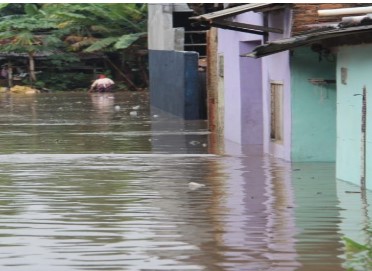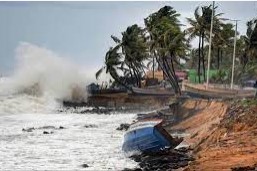
STRATEGIC ASSESSMENT. The United Nations Intergovernmental Panel on Climate Change (IPCC) released a major scientific report detailing the devastating impacts of global warming, noting that human activity has undoubtedly changed the climate in unprecedented and irreversible ways. The report’s findings were approved by 195 world governments in a virtual meeting last week. Over 200 scientists from across the globe analyzed more than 14,000 research papers to draft the report, the first major review of climate science since 2013. The report’s stark findings, which UN Secretary-General Antonio Guterres described as a “code red for humanity,” argued that worst-case scenarios can be avoided with drastic cuts to global emissions. The report will be a primary discussion point at the upcoming UN Climate Change Conference (COP26) taking place later this year in the United Kingdom.
The IPCC report comes amid a summer of extreme weather events that have caused mass devastation across the globe. In late July, historic flash floods in China’s central Henan province killed dozens and displaced hundreds of thousands of people, as torrential downpour collapsed more than 8,000 buildings, flooded subways and highways, and caused an estimated $2 billion in economic loss. Some areas received a year’s worth of rain in just a few days, including the provincial capital of Zhengzhou, where eight inches (twenty centimeters) of rain fell in just one hour. The unprecedented rainfall far exceeds typical summertime levels and is among the most significant on record globally.

In Oregon in the U.S., 116 degrees Fahrenheit (nearly 47 degrees Celsius) weather persisted for several days in a row in June 2021 in what one scientist labeled “the most anomalous heat event ever observed on Earth.” Widespread wildfires are proving unmanageable. The persistent drought in California, Arizona, Nevada, and elsewhere in the American “Sunbelt” threatens future growth, including the viability of entire regions at current population levels and scales of water use. No area of the globe is spared, with floods inundating Germany, Belgium, Nigeria, Uganda, and India in July 2021, killing hundreds; terrifying photographs of wildfires on the Greek island of Evia have become for many an illustrative example of the worst predictions of the IPCC report.

Unfortunately, extreme weather events like these are becoming increasingly normal—and worrisome. The regular flow of modern life depends not just on a predictable climate, but also on a predictable way to manage the cascading impact of climate change. The near-term risks of rising temperatures are being increasingly felt across the globe, as the events of this summer have highlighted; the risks currently seen in extreme weather events are not manageable, at least on the scale of what is regularly unfolding. The extensive damage caused by recent disasters has laid bare the fact that most countries are drastically unprepared to handle extreme weather events—even the wealthy ones. Take for example the United States, whose crumbling infrastructure is in desperate need of repair, refurbishment, and redesign. This past winter, a severe cold snap broke Texas’s power grid, with fatal results. In June, a heat wave on the West Coast melted roads and killed hundreds. Urban life as currently devised is unbearable without steady electricity and air conditioning. The hyper-partisan nature of the current American political system means little hope for consensus and action on the scale necessary to meet this challenge head on. Without substantial change, the U.S. will experience increasingly powerful weather events on an accelerating timeline, and the U.S. position remains a critical factor in any effective global response.

It remains unknown how much of the accelerating climate change is reversible; the time to act for what is happening now was decades ago. But the impacts of climate change can and likely will get worse as nations think about their short-term amid a long-term crisis. Climate change is already having a direct impact on geopolitics, with conflict over land, water, food, and energy only likely to intensify in the near future. To that end, the time to prevent worst-case scenarios is now, and the U.S. and its partners and allies (who, along with China) contribute to most of the greenhouse gases and overall pollution simply must make signifiant changes to the status quo to avoid a point of no return. UN Climate Change Executive Secretary Patricia Espinosa recently pleaded with a group of energy and environment ministers from G-20 nations, remarking, “What more can numbers show us that we cannot already see? What more can statistics say about the flooding, the wildfires, the droughts and hurricanes and other deadly events?” There is hope that the U.S. rejoining the Paris Accord later this year will increase momentum in pursuing solutions to climate change. The U.S. was the only country to withdraw from the Paris climate agreement, which set a poor example and eroded trust among other nations. U.S. Specialy Presidential Envoy for Climate John Kerry has a steep road ahead of rebuilding trust in America’s commitment to a global solution, especially with questions looming about the direction of U.S. policy ahead of the 2024 presidential election.
In countries like the U.S., depending on individual consumer choices to reverse trends caused by global industries has never been a credible strategy to address accelerating climate change. On the contrary, it simply encouraged more production and consumption, but with a different marketing approach. Meanwhile, the environmental impacts compounded year after year, accelerating the loss of sea ice and glaciers, the extinction of species, and the altering of entire ecosystems. These impacts—persistent droughts with periodic devastating flash floods, rising sea levels that will rise even more as polar regions melt, and more frequent and more intense storms—are global challenges. Security is inextricably linked to climate, and experts have already spent the better part of the past decade linking “water wars,” population movements, and the ensuing competition for resources with hotspots of insecurity and conflict. Geopolitical competition for access to resources also shapes if or how governments respond to human rights violations, violent conflict, and other international pressure points. However, responding to this challenge requires more than increasing defense budgets. When crafting their policies around the environment, greenhouse gas emissions, infrastructure, and public services, governments can follow existing guidelines recommended by existing international bodies and scientific experts—including findings from the Paris Agreement and the IPCC assessment reports, to name a few examples. Any smart and sound national security strategy should be predicated upon the clear-cut impacts of climate change, while also anticipating some of the other contingencies that could occur, from dealing with humanitarian crises, to providing disaster relief, to some of the most devastated corners of the globe and their increasingly vulnerable populations (TSC).





